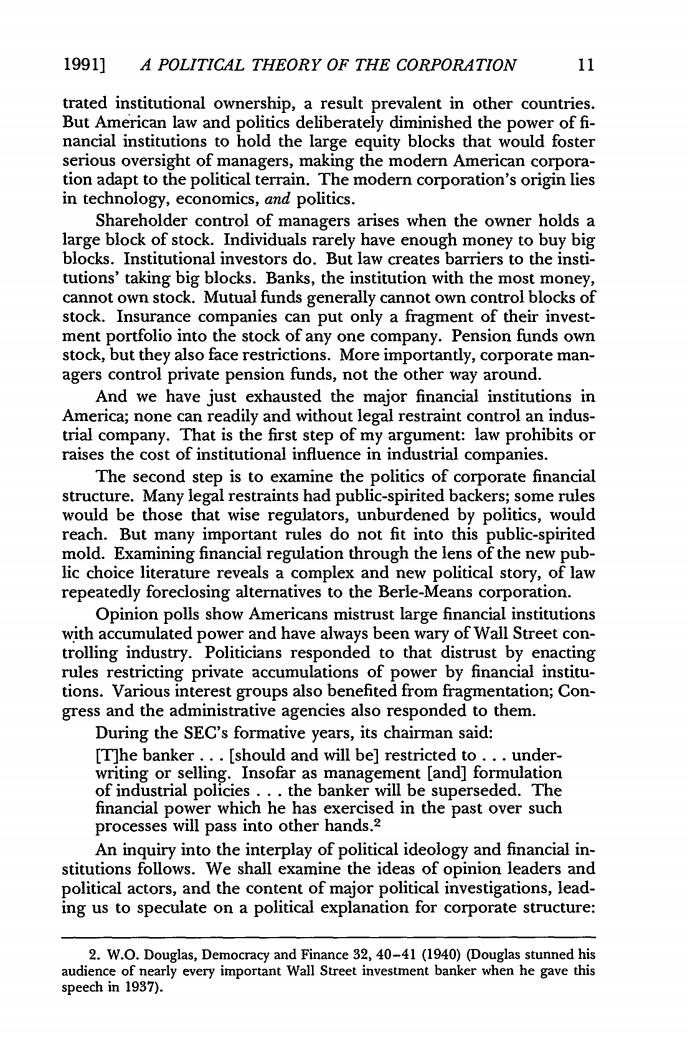正在加载图片...

1991] A POLITICAL THEORY OF THE CORPORATION trated institutional ownership,a result prevalent in other countrie But American law and politics deliberately diminished the power of fi- nancial institutions to hold the large equity blocks that would foster serious oversight of managers,making the modern American corpora- tion adapt to the political terrain.The modern corporation's origin lies in technology,economics,and politics Shareholder control of managers arises when the owner holds a large block of stock.Individuals rarely have enough money to buy big blocks.Institutional investors do.But law creates barriers to the insti- tutions'taking big blocks.Banks,the institution with the most money can own stock. Mutual funds generally can ot own cor ntrol blo cks c stock.Insurance companies can put only a fragment of their invest- ment portfolio into the stock of any one company.Pension funds own stock,but they also face restrictions.More importantly,corporate man- agers control private pension funds,not the other way around. And we have just exhausted the major financial institutions in America;none can readily and without legal restraint control an indus- trial company.That is the first step of my argument:law prohibits or raises the cost of institutional influence in industrial companies. The second step is to examine the politics of corporate financial structure.Many legal restraints had public-spirited backers;some rules would be those that wise regulators,unburdened by politics,would reach.But many important rules do not fit into this public-spirited mold.Examining financial regulation through the lens of the new icchoice literature reve als a complex and new repeatedly foreclosing alternatives to the Berle-Means corporation. Opinion polls show Americans mistrust large financial institutions with ulated d have aly h d of Wall Street con- trolling industry. Politicians responded to that distrust by enacting rules restricting private accumulations of power by financial institu- tions.Various interest groups also benefited from fragmentation;Con- gress and the administrative agencies also responded to them. During the SEC's formative years,its chairman said Ishould and will bel restricted to under Insofar as manag ent [and]for ustrial policies the banker will be superseded.The financial n er which he has exercised in the past over such processes will pass into other hands.? An inquiry into the interplay of political ideology and financial in stitutions follows.We shall examine the ideas of opinion leaders and ing us to speculate on a political expl nation for corporat e str cture 2.W.O.Douglas,Democracy and Fi rly every important Wall Street vestment banker speec n193% 1991] A POLITICAL THEORY OF THE CORPORATION 11 trated institutional ownership, a result prevalent in other countries. But American law and politics deliberately diminished the power of financial institutions to hold the large equity blocks that would foster serious oversight of managers, making the modem American corporation adapt to the political terrain. The modern corporation's origin lies in technology, economics, and politics. Shareholder control of managers arises when the owner holds a large block of stock. Individuals rarely have enough money to buy big blocks. Institutional investors do. But law creates barriers to the institutions' taking big blocks. Banks, the institution with the most money, cannot own stock. Mutual funds generally cannot own control blocks of stock. Insurance companies can put only a fragment of their investment portfolio into the stock of any one company. Pension funds own stock, but they also face restrictions. More importantly, corporate managers control private pension funds, not the other way around. And we have just exhausted the major financial institutions in America; none can readily and without legal restraint control an industrial company. That is the first step of my argument: law prohibits or raises the cost of institutional influence in industrial companies. The second step is to examine the politics of corporate financial structure. Many legal restraints had public-spirited backers; some rules would be those that wise regulators, unburdened by politics, would reach. But many important rules do not fit into this public-spirited mold. Examining financial regulation through the lens of the new public choice literature reveals a complex and new political story, of law repeatedly foreclosing alternatives to the Berle-Means corporation. Opinion polls show Americans mistrust large financial institutions with accumulated power and have always been wary of Wall Street controlling industry. Politicians responded to that distrust by enacting rules restricting private accumulations of power by financial institutions. Various interest groups also benefited from fragmentation; Congress and the administrative agencies also responded to them. During the SEC's formative years, its chairman said: [T]he banker... [should and will be] restricted to ... underwriting or selling. Insofar as management [and] formulation of industrial policies . . . the banker will be superseded. The financial power which he has exercised in the past over such processes will pass into other hands.2 An inquiry into the interplay of political ideology and financial institutions follows. We shall examine the ideas of opinion leaders and political actors, and the content of major political investigations, leading us to speculate on a political explanation for corporate structure: 2. W.O. Douglas, Democracy and Finance 32, 40-41 (1940) (Douglas stunned his audience of nearly every important Wall Street investment banker when he gave this speech in 1937)